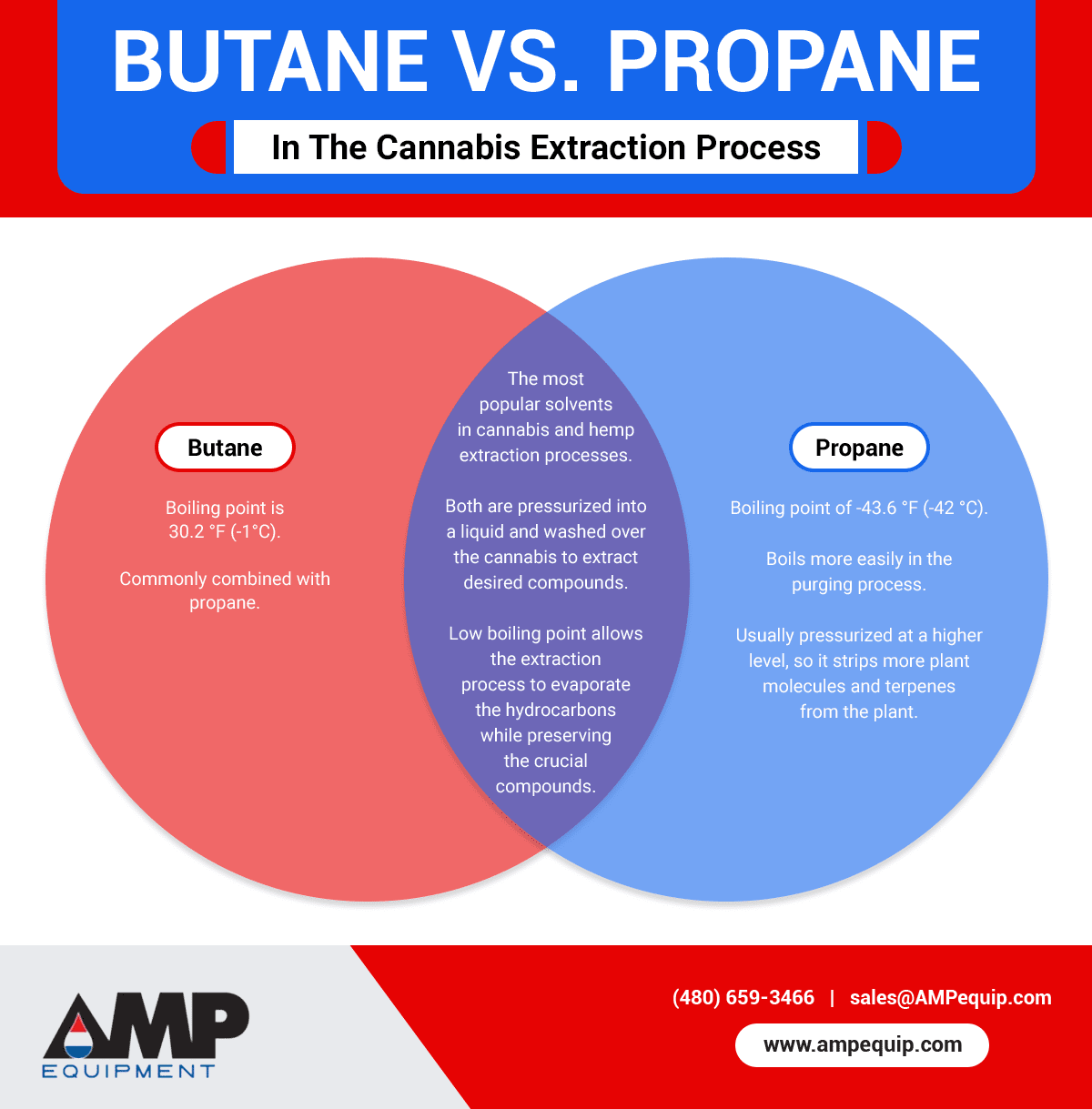Over the past few years, methods for solvent extraction have advanced significantly, with common solvents including hydrocarbons and ethanol. Hydrocarbons are organic compounds that only contain hydrogen and carbon atoms. In cannabis production, these compounds are usually butane and propane. Proper hydrocarbon extraction is key to reducing production risks and creating products safe for human consumption. The process produces oil, wax, glass, or hash extracts used in premium quality vape products, edibles, and more.
AMPE manufactures high-performance hydrocarbon extraction equipment that can produce a full spectrum of edibles, vape cartridges, capsules, and topicals. Learn more about the hydrocarbon extraction process here.
What Is Hydrocarbon Extraction?
Hydrocarbon extraction is used to extract terpenes, cannabidiol (CBD), and tetrahydrocannabinol (THC) from cannabis plants. Butane is the most popular solvent, but some processes may use a blend of butane and propane.
When the pressurized butane or propane is passed through the cannabis, it separates the terpenes, CBD, or THC. Once the compounds are collected, the solvents are removed through boiling and evaporation.
Butane vs. Propane
Butane and propane are the most popular solvents in cannabis and hemp extraction processes because of their low boiling point. This allows the extraction process to evaporate the hydrocarbons while preserving the crucial compounds.
Butane’s boiling point is 30.2 °F (-1 °C). It is pressurized into a liquid and washed over the cannabis to collect the desired compounds, which are then boiled to remove the butane. It is commonly combined with propane, which follows a similar extraction process.
With a boiling point of -43.6 °F (-42 °C), propane is pressurized, liquified, and washed over the cannabis to extract the necessary compounds. It boils more easily in the purging process. Propane is usually pressurized at a higher level, so it strips more plant molecules and terpenes from the plant.
Hydrocarbon Extraction Process
Before the hydrocarbon extraction process begins, make sure the initial plants have not been exposed to UV light, oxygen, or heat, as these factors can negatively impact the quality of the final extract. The plants should be vacuum-packed and stored in an environment free from light and temperature fluctuations. Here is a detailed look at how to extract premium-quality terpenes, CBD, and THC oils:
- Hydrocarbon wash/Primary extraction: Primary extraction involves running cold hydrocarbons in a pressurized chamber containing the cannabis plant. The terpenes and cannabinoids separate from the plant matter and bind to the hydrocarbons.
- Refinement/Winterization: Winterization is used to obtain a highly concentrated solution of terpenes, cannabinoids, or flavonoids. The crude extract from the hydrocarbon wash is combined with a secondary solvent, usually ethanol, and kept below freezing point. The concentrated oil molecules are then separated from waxes and lipids through filtration.
- Concentrate collection: The filtered concentrate is passed through a collection pot, which is heated to remove residual solvents. The process uses a closed-loop system, where the evaporated butane is sent back to the solvent tank.
- Removing residual solvent: The desired purity of the concentrate dictates how many times this closed-loop system will be repeated. For example, to produce a high-purity wax, the solution is whipped for several hours to purge all residual solvent.
- Post-processing: Once the necessary purity is achieved, the concentrate can undergo various post-processing techniques to create a certain style of product.
Here are some examples of cannabis concentrate post-processing:
- Centrifugal terpene removal: This process uses centrifugal force instead of heat to isolate terpenes from the concentrate, preserving purity.
- Winterization: Post-process winterization further crystallizes unwanted lipids from the solution, leaving behind high-purity cannabinoids.
- Decolorization: Color is one of the biggest obstacles to achieving a purified concentrate. Leftover chlorophyll leaves the concentrate looking dark and tasting bitter. Carbon scrubbing can clear the concentrate, leaving it a golden color.
- Dewaxing: Similar to winterization, dewaxing also removes lipids and waxes. The difference is that dewaxing uses low-temperature, single solvent filtration.
- Vacuum purging: Vacuum purging removes residual propane and/or butane using a low-heat, low-pressure oven.
- Decarboxylation: Decarboxylation uses heat to remove carbolic acids from the cannabinoid.
- Co-solvent separation: Co-solvent extraction matches certain solvents to certain cannabinoids for more effective separation.
- Co-solvent crystallization: Co-crystallization is a process that isolates cannabinoids by crystallizing and matching them with certain solvents.
Benefits of Hydrocarbon Extraction Over Other Methods
Manufacturers choose hydrocarbon extraction over other options—like CO2 extraction—for various reasons, including:
- Efficiency: Hydrocarbon extraction is one of the quickest, most efficient ways to achieve refined cannabis concentrates. A single production cycle takes one hour, whereas a CO2 cycle can take up to 10 hours. Plus, hydrocarbon extraction preserves compound potency because it occurs under low heat.
- Versatility: Varying extraction and post-processing techniques can create different types of products and potency levels.
- Purity: Hydrocarbon extraction purges unwanted solvents, lipids, and waxes without destroying the flavor and aroma of the product. Post-processing further purifies the final product. Preserving terpenes, in particular, is important for producing a full range of cannabis products with all their therapeutic properties intact.
- Safety: When performed in regulation-compliant facilities, using butane and propane in hydrocarbon extraction is safe. Safety becomes a concern when amateur manufacturers use these flammable substances in non-compliant extraction processes.
- High yields: Hydrocarbon extraction yields 14-30% concentrate by weight, whereas CO2 methods yield only around 8%. Manufacturers waste less plant material and save on overall extraction costs.
AMPE Custom Equipment Solutions
American Material Processing Equipment manufactures standard and custom hydrocarbon extraction equipment that guarantees high-purity cannabinoid products. Whether you’re looking for a brand-new solution or seeking to refine existing equipment, we are ready to help you grow your cannabis business. All our equipment can be built for peer review and ASME approval.
Learn more about our custom design services and capabilities, or contact us to discuss your unique needs.

